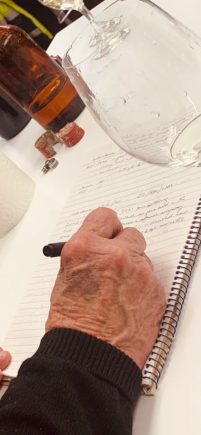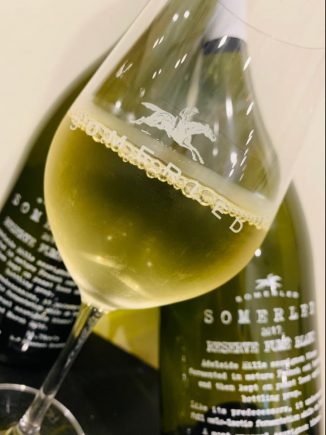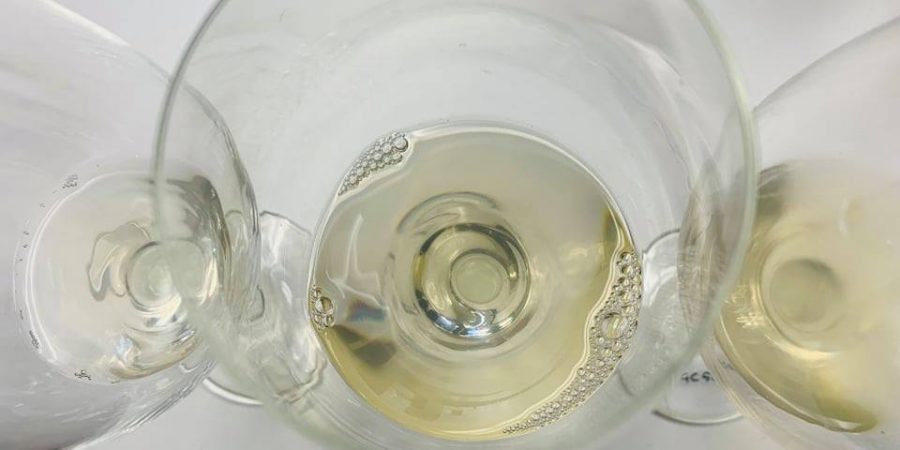More good news! This time for the Fumé Blanc fans.
Our 2021 is heading to the bottling line on Monday!
Rob and Lucy were at the winery on Tuesday. They did the final tasting before it gets loaded onto the truck destined for Boutique Bottlers.
You may recall from this post a few weeks back, we had a quick chat about wine additions. The sorts of “tweakings” that happen in the lab to prepare a wine for bottle.
Let’s take a sneak peek inside Rob and Lucy’s tasting at Lodestone this week. We’ll find out if Rob is using any of these winemaking techniques with the latest of his vintage 2021 wines….

(this smiling face next to Rob is Lonestone’s assistant winemaker Jackson – say “Hello” to Jackson, he helps to make the wines you love so much!)
Residual Sugar
What I forgot to mention in that wine additions post from a few weeks back is that there are two different types of sugar additions. The one I spoke about, which is illegal here in Australia, is the addition of sugar or concentrated grape juice BEFORE the fermentation process. This is handy when your grapes come from a super cold region where it’s difficult to ripen grapes (ie. nowhere in Aus!).
It doesn’t make the wine sweeter, it just means that there is more sugar available during the fermentation process. The main purpose of this addition is to increase the final alcohol level in the finished wine.
However…
There is a sugar add that we are allowed to make in Australia and that is done AFTER the fermentation process. This one adjusts the “residual sugar”, which is the sugar leftover in the wine once the fermentation is complete. It definitely changes the taste (sweetness) of the finished wine.
Now, if you’ve had one of Rob’s wines (and if you haven’t… what are you waiting for??!!) you’ll know he likes them dry. Nice and dry. But, the great thing about tasting the wine at the lab before it’s bottled is that you can give anything a go. So, it never hurts to ask the “what would happen if…?” question. Even for a winemaker who loves a dry wine.
And any good scientist knows that the only way to find out ANYTHING is to ask questions.
So, the questions that Rob and Lucy asked were:
What would happen to this wine if we added…
- nothing?
- 1g of sugar per litre?
- 2g of sugar per litre?
- 3g of sugar per litre?
And this is what they found out…
Even at an excruciatingly low 1g of sugar per litre, the wine became viscous and full. It wasn’t necessary and even gave the wine a lingering ‘sugariness’.
Even though there was a little contention amongst the tasters, Rob and Lucy decided to keep it at zero added sugar!
Acid

Although all winemakers would like their wines to be perfectly balanced when it comes to acid, the reality is, they don’t always turn out like that. No matter how skilled they are.
Winemakers have a couple of things up their sleeve for just such an occasion…
De-acidifiers Adding Calcium Carbonate to wine will reduce high acid levels and increase the pH. This practice is common in areas that have cooler weather and ripening is challenging.
Acidifiers What if there’s not enough acidity? Tartaric Acid, Malic Acid and Citric Acid or any blend thereof could help balance the wine. Adding acid is common with lower acidity grapes in warmer regions.
When it comes to the 2021 Fumé Blanc though, the consensus was that the wine was beautifully balanced and really didn’t need anything else.
But, once again, a good scientist always asks questions.
And the two that were asked here were:
What would happen to this wine if we added…
- Citric acid (just like the one you find in orange juice)?
- Malic acid (found in apples)?
And the answers…?
Malic acid made the wine way too “hard”.
Citric acid, however, created a really pretty aliveness to the wine! Again, there was a little contention amongst the tasters, but in the end, Rob and Lucy agreed that 0.2g citric acid was perfect. “Not too shrill, just lovely!”
Loving our blog? Sign up for weekly updates straight to your inbox…
Rob was so happy with this wine straight out of the barrel.
But he was even happier after tweaking it just a little.
And satisfied that any further changes would have been detrimental to the finished product.
It goes to show how important it is to ask questions – even if you think you know the answer.
And as a winemaker with over 50 years of experience, you’d probably think you’d have most of the answers. But not Rob. I guess this is what makes him one of the best!
 Now, back to those Fumé fans…
Now, back to those Fumé fans…
When we ran out of our 2019 vintage, Rob generously opened his cellar and released some of his Museum 2016 and 2017 to keep you going until the 2021 was ready.
If you have been tasting along at home, here are some early tasting notes so you know what to expect from this new vintage:
“The sauvignon blanc grapes were picked slightly later than usual. So, there are more tropical elements in the wine than usual. The wine has a great attractive play of flavours alongside malo (which is already showing up!) and subtle oak”.
I can’t wait!
You too? Let me know via email and we’ll pop some aside for you as soon as it’s ready!

Hullo, I will have to wait, patience and anticipation are some of my virtues!!!
Enjoy life Froggy.